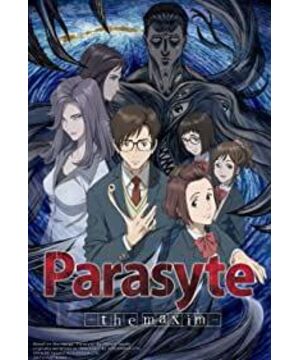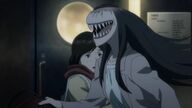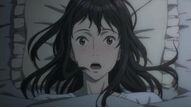After reading "Parasitic Beast", I want to leave a film review for it. The most outstanding point of "Parasitic Beast" is the characterization. All the main characters grow and develop. All behaviors and motivations are foreshadowed and reasonable, and there are four characters I want to talk about.
✔ Izumi Shinichi
Quan Xinyi has experienced three stages: "kind and weak high school student", "indifferent and numb PTSD patient", and "ordinary person with emotion and responsibility". Before the mother was killed by the parasitic beast, although the character of the male protagonist had some changes due to Xiaoyou (for example, he was not afraid of spiders), he was still a kind but indecisive teenager in essence. This stage did not end until the end of Chapter 5, when Quanxin had a mental breakdown in the face of the parasite that looked like a mother and was pierced through the heart. The cruelty of this scene is almost unique in the works of the same type that I have seen. I am afraid it is only comparable to the scene in Telltale's "The Walking Dead" where Lee, the infected male protagonist, makes the little girl Clementine shoot himself. But it is such a dark positive portrayal that lays a convincing basis for the second phase of "cold numbness". After being rescued by Xiaoyou, Quan Xinyi embarked on a journey to find his father. Before leaving, Satomi's sentence "Will you come back?" can be seen as the beginning of the second stage. At this time, Satomi was already keenly aware of the change in the male protagonist. Later, the male protagonist threw the dead puppy into the trash can and showed indifference to the deaths of Kana and other classmates, which gradually confirmed her judgment. Izumi Shinichi's lack of emotion, at first thought that the heart repair came from the small right cells, but after thinking about it, the deeper reason may not be able to get out of the trauma of losing his mother. The end of the second stage comes from the scene in episode 18 where Tian Gong Ryoko entrusts the baby to the male protagonist before his death, and the male protagonist "sees" his mother again. The male protagonist shed tears for the first time since losing his mother, and Satomi also said, "You are finally back." These tears are probably not only for the mother, but also for the dead Kana and classmates, and for the sensitive and sad Satomi. Since then, the male protagonist has experienced the police's encirclement and suppression of parasites, the battle against Goto, and the confrontation with Urakami. At this time, although Izumi Shinichi has regained his emotions, he has not yet gotten rid of the hesitation and weakness in his nature. It was not until he lost Xiaoyou and faced the almost invincible Goto alone that he truly learned to be independent and responsible. It is precisely because of this that the male protagonist can save Satomi from Urakami after losing "Little Right".
✔Murano Satomi
I met the male protagonist on the first day of high school and had a good impression of each other, but the relationship was not officially established until later. Satomi has delicate emotions and can accurately detect the changes in Xinyi's mental state. But due to various reasons, Xinyi has not been able to open up to her for a long time, and his attitude towards her is also capricious, which is undoubtedly extremely painful for a person with a careful mind. Although she is the heroine, except for the school massacre when she was rescued by the male protagonist as a vase, she lacked a sense of presence in the whole play, which made me think that this role was superficial. However, at the end of the final words, Satomi, who was kidnapped, gave the profound insight that "the reason why humans are different from beasts is to cherish all life". And when the crisis was lifted, she and Quan Xinyi collapsed on the roof of the office building together. When they were found, they could still smile calmly and say, "We are also regarded as victims." It can be seen that after some experience, Li Mei's growth is not inferior to that of the male protagonist.
✔ Kanai
The North High School student of the unrequited male protagonist. Her appearance gave me the illusion that this work was going to be closer to the novel "Host" of the same theme. "Host" is written by Stephanie Mayer, the same person who wrote "Twilight." But Yan Mingjun is not a girl writer who likes to engage in love triangles. In chapter 12, Kana is directly written in the arms of the male protagonist. After Kana's death, Izumi Shinichi said regretfully, "If I didn't ask her out but went to the movies with Satomi, this would not have happened." Xiao You replied, "It will happen sooner or later." A moth-to-fire love tragedy, like Alpenne in Les Misérables. For a young soul full of fantasy, such a method of death may not be too bad.
✔ Tamiya Ryoko
This character is very interesting. First of all, although she is a parasite, the animation does not depict too many scenes of her eating people. In the film, she appears more in the image of the female teacher Tamiya Ryoko, which is conducive to the audience's emotional acceptance. Secondly, parasites have an instinct to eat people, and most of them are indifferent to other things except to fill their stomachs. And she is more of an observer, interested in the origin of parasites: "Why did we come to this world?". After becoming pregnant with a human fetus for "research purposes", with the increase in contact with the male protagonist, she also developed considerable interest in humans, perhaps because in her opinion, humans are the answer to her "ultimate question". played an important role. The qualitative change of this character also occurred in Chapter 18. The moment the detective flopped her baby, Xiao You felt that she was emitting a new "brain wave wavelength", which is love. Before being shot by the police, she entrusted the baby to the male protagonist, which indirectly untied the male protagonist's heart. This is where the two plots meet in a wonderful way. Her death also answered that ultimate question to some extent (see below for details). If the relationship between Izumi Shinichi and Xiaoyou represents the running-in between the two biological individuals, then Tamiya Ryoko and the human mayor Hirokawa Masashi represent a certain degree of mutual understanding and relationship between the two species. identify.
✔The ultimate question of Ryoko Tamiya: Why did the parasites come to this world?
A major point of view in the play is that human beings are toxins, the "parasitic beasts" of the earth, and need a neutralizer to detoxify the earth, and parasites are such an antidote (speaking of the mayor of human beings, Hirokawa Masaki). As the creature at the top of the food chain, human beings continue to destroy nature without restriction. Only the emergence of more powerful predators can restrict human beings and maintain the balance of nature. Goto thought so, and Tamiya Ryoko probably thought the same at first. The number of parasites is far less than that of humans. In order to achieve this, they must first be able to hide, so they can change into the appearance of humans and infiltrate the crowd. Secondly, they should have a physical quality that is far stronger than that of human beings and an IQ equivalent to that of human beings. Finally, they should be absolutely rational, that is to say, they should not be held back by emotions except for the "hunting" instinct, and take survival as the first priority. If this idea were to hold, then parasites should be like programmed terminators, "spiders are born to spin webs." But Tamiya Ryoko's transformation shattered all of this. She was first delighted with the diversity of her homogeneous characters in a one-on-three infighting, and then she felt the love and gave up the chance to give birth to her own child, a human baby. I handed it over to Izumi Shinichi. This shows that although parasitic organisms possess high intelligence, they are not "god punished" by humans. They belong to the same world as we do, and the two should learn to coexist. In fact, at the end of the animation, parasites are hidden in human society and no longer feed on humans. Why didn't the male protagonist kill Gotou at first, and then came back to make up for it? It's a question of ability. The male protagonist is not Goto's opponent at all in terms of ability. There is a lot of luck in winning (finding weakness + cyanide garbage dump). The premise of showing magnanimity is that his ability is far superior to his opponent. The moment Shinichi defeated Goto, he had a heroic illusion that the fate of the two races was in his own hands. But then I figured out that I was just an ordinary person, facing a far stronger opponent, it was already very difficult to protect the only one or two loved ones left, and if I was not careful, I would be counter-killed.
✔ Environmental issues
Mayor Hirokawa Gangzhi: "Since we have to go back on our word in the end, don't say it in a high-sounding manner at the beginning. In the end, environmental protection is a distorted way of self-protection for human beings."
Human beings are the dominant creatures at this stage of the earth, and all the criteria for judging morality and right and wrong are based on their own interests. This in itself is understandable, but dealing with other species with this set of standards can be problematic. It's as if everyone has their own values and it's fine, but if you use your own set to criticize and demand others, it will inevitably lead to conflicts. It is a pity that most people do not do well at this point, after all, criticizing others is an important means of self-satisfaction. The issue of environmental protection is, in the final analysis, a human issue.
View more about Parasyte: The Maxim reviews










